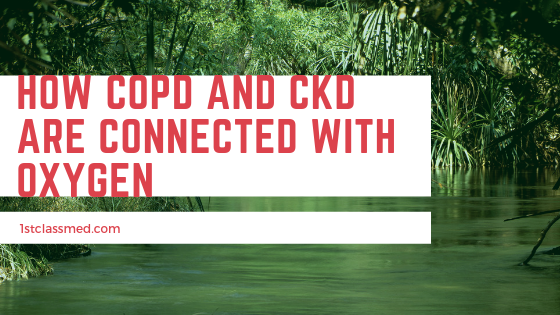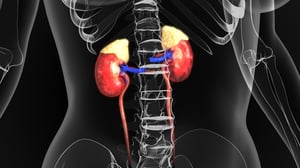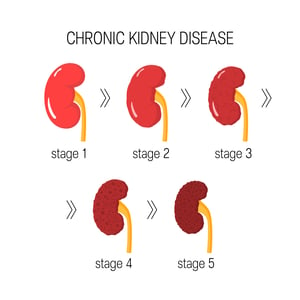
Chronic obstructive pulmonary disease affects the lungs, causing damage to the lungs and how they work, but that may not be all.
In recent years studies have been done to find the connection between COPD and chronic kidney disease (CKD).
This is not shocking, as many with COPD have experienced ongoing problems with their kidneys as well.
The link is most likely because of lack of oxygen, which the kidneys need to function properly.
The Kidneys
Our kidneys are two bean-shaped organs that work in our renal system.
The renal system helps remove waste from the body, regulate blood volume and pressure, controls electrolyte levels and regulates blood pH levels.
On top of that, our kidneys are used to help filter blood and send it back to the heart.
Our kidneys are located in the upper abdominal area, up against the back muscles on both sides (right and left) of the body.
They are right below the rib cage and are the size of a fist.
Kidney Functions
Waste Removal:
Our kidneys process nearly 200 quarts of blood, removing any extra waste or water.
This waste is from normal breakdown of active muscle, as well as the food we consume daily.
When we digest the food, our body uses this food for energy and to repair itself, once our body is done with the food, the remaining waste is sent to the blood.
Your kidneys have to remove the waste to prevent build up in the blood and damage to the body.
After the waste is removed from the blood, it is sent to the urinary system to remove it from the body.
Regulation of Blood Volume and Pressure:
The kidneys play a vital part in balancing fluid levels in the body and regulating blood pressure.
When a fluid in the body (i.e. blood volume or sodium levels) has low levels (or levels are too high) cells in the kidney will release an enzyme called renin.
Renin converts angiotensinogen (produced in the liver) into a hormone called angiotensin 1.
From there another enzyme called angiotensin-converting enzyme (ACE) (found in the lungs) then metabolizes angiotensin 1 into angiotensin 2.
Angiotensin 2 causes blood vessels to constrict, raising blood pressure and stimulate the release of hormone aldosterone (in the adrenal glands), causing the renal tubules to retain sodium and water and excrete potassium.
Through this long process it can raise blood volume, blood pressure and sodium levels in the blood to help restore normal levels of sodium, potassium and other fluids.
Electrolyte Level Regulation:
Electrolytes (carrying an electric charge when dissolved in liquid, i.e. blood) are minerals such as sodium, potassium, chloride and bicarbonate, which helps regulate nerve and muscle function throughout the body.
It also helps maintain acid-base balance and water balance throughout the body.
The kidneys help by maintaining electrolyte concentrations through filtering electrolytes and water from the blood and keeping some in the blood while removing the rest and excreting it through urine.
If the balance of electrolytes is too high or too low and is not corrected, a disorder can develop.
Regulation of Blood pH Levels:
Our everyday routines can produce a lot of acid as a byproduct, from using our muscles to digesting food.
Luckily, we have kidneys to help regulate pH levels in the body.
The kidneys adjust pH levels slowly, in normal, healthy people, the kidneys excrete hydrogen ions (acidic).
If the body has abnormal levels of pH, the kidneys can excrete bicarbonate or hydrogen in different quantities (more or less) in order to bring pH levels back to normal.
Oxygen’s Role in Kidney Function
Oxygen is naturally in our blood, so when it reaches the kidneys it leaves some oxygen behind, so they can remain healthy.
Oxygen helps the kidneys function, without oxygen the tissue of the kidneys can become fibrous and cannot filter the blood and regulate salt levels normally.
As with every other organ in the body, oxygen is vital for proper function.
When oxygen levels are low in the body, it can cause damage to the kidneys, and many other organs.
For those with COPD it is not uncommon to have other health conditions, as your whole body need oxygen, so when you are not getting as much oxygen, your body can suffer.
In recent studies over the past few years, COPD and CKD have been linked.
Research found that many with CKD patients were at a high risk of pulmonary-related death.
When there are low oxygen levels in the blood, hypoxia, the organs do not receive enough oxygen.
Over an extended period of time, if oxygen remains low, the kidneys can go into renal failure and later turn into CKD.
Chronic kidney disease (CKD) can result in fibrous tissue that damages the nephrons, preventing them from filtering blood.
Fibrosis can become worse when the kidneys become hypoxic, meaning they are receiving low levels of oxygen.
Though not directly linked, oxygen and kidneys work closely together to maintain normal body functions.
Improving Oxygen Levels:
In order for many with COPD to prevent or slow the development of CKD, it is important to keep oxygen levels at a healthy level.
This may require supplemental oxygen, medications or respiratory therapy.
Your doctor will determine what route of treatment will work best for you in order to prevent oxygen levels from getting too low.
Now that more research has linked COPD and CKD, doctors have become more proactive when treating COPD and CKD.
Symptoms of CKD:
Early on, symptoms may not be noticeable or there may be no symptoms in general, but as the disease progresses the symptoms will appear and be more noticeable.
If you notice any of the following symptoms, give your doctor a call and make an appointment.
- Changes in frequency of urination
- Tiredness or drowsiness
- Loss of appetite
- Swelling in the hands or feet
- Itchiness or numbness
- Nausea or vomiting
- Muscle cramps
- Skin darkening
Unless symptoms are very noticeable, CKD is often diagnosed after routine blood or urine testing.
If your doctor suspects CKD there are a few tests that may be done in order to properly diagnose it.
They may start by measuring your blood pressure, as abnormal blood pressure levels are a cause of kidney disease and can indicate kidney disease.
A urine test may be done to check for any abnormal levels of proteins.
The final test that may be done will measure the levels of serum creatinine to look at the glomerular filtration rate (GFR).
If you are diagnosed with CKD, your doctor will most likely make a treatment plan for your COPD and your new diagnosis.
For those with COPD, developing chronic kidney disease can be a concern, as a lack of oxygen in the body can damage the kidneys.
But if you are receiving a healthy amount of supplemental oxygen and your oxygen levels are good, then there should be no major concern for developing CKD.
Once diagnosed with COPD, speaking with a doctor about risks for other diseases is important to make a preventative plan.






